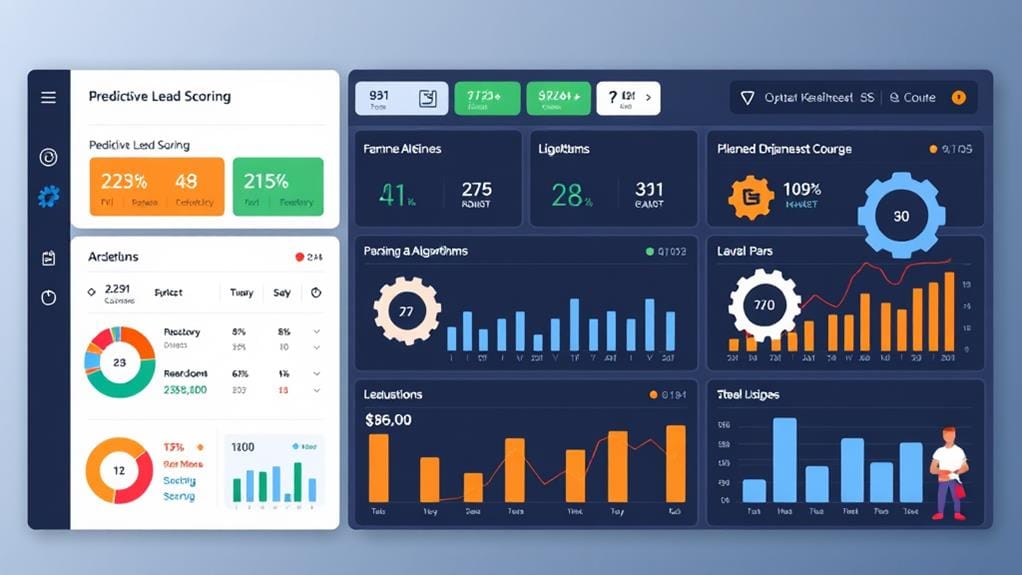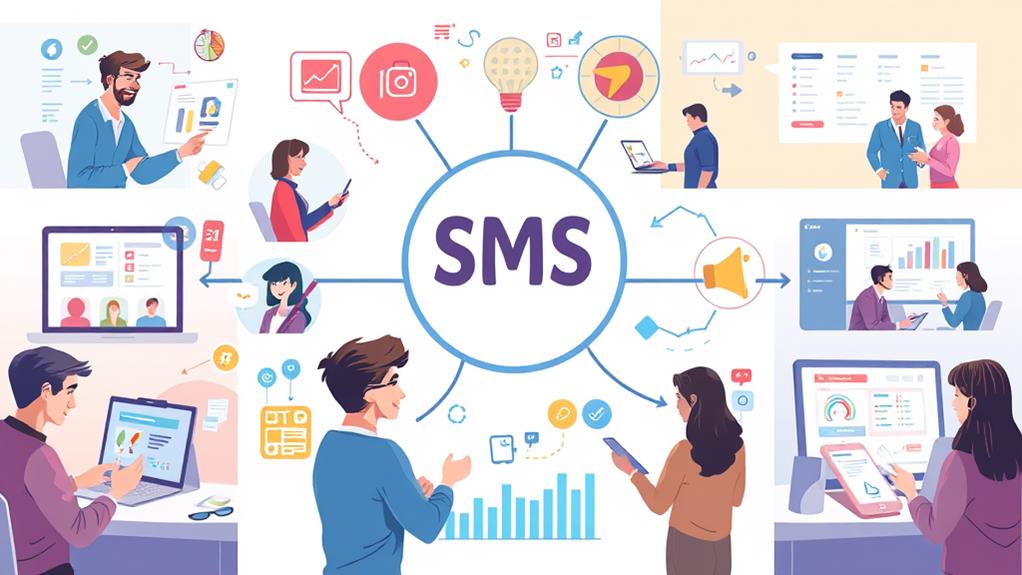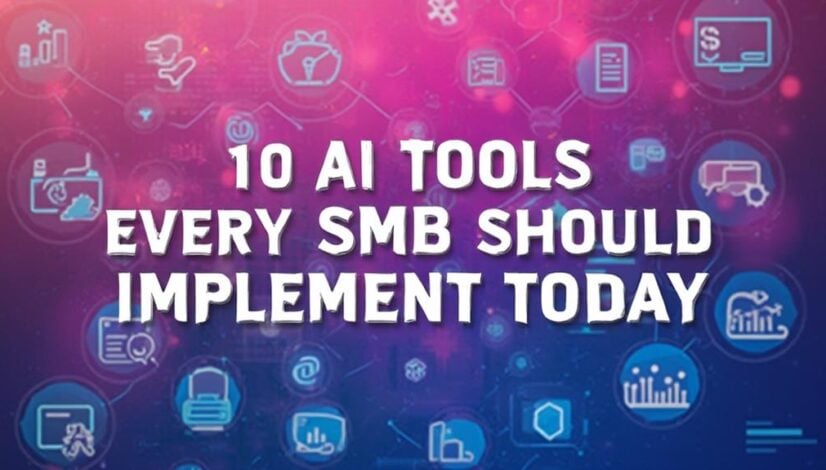Top 10 AI Tools Every SMB Should Implement Today
Small to mid-sized businesses (SMBs) can greatly enhance their operations by implementing key AI tools. Start with chatbots for customer support to provide 24/7 engagement. Then, explore automated email marketing for personalized communication. Invest in AI-powered analytics tools to drive data-driven decisions, and utilize virtual assistants to streamline task management. Don't overlook social media AI tools for effective outreach and predictive lead scoring to identify high-value prospects. Incorporate invoice management solutions and AI-driven personalization for tailored customer experiences. Finally, advanced inventory management will optimize your supply chain. Curious about how these tools can transform your business? There's more to explore!
Key Takeaways
- Implement chatbots for 24/7 customer support, streamlining operations and allowing human agents to focus on complex inquiries.
- Use AI-driven personalization tools to tailor marketing strategies and foster stronger customer relationships through targeted content and offers.
- Automate email marketing to enhance engagement, optimize deliverability, and improve customer loyalty through personalized messaging.
- Utilize AI-powered analytics tools for real-time insights, predictive analytics, and enhanced data visualization to inform strategic decision-making.
- Adopt virtual assistants for task management to automate repetitive tasks, improve productivity, and streamline team collaboration effectively.
Chatbots for Customer Support

In today's fast-paced business environment, chatbots are revolutionizing customer support for small and medium-sized businesses (SMBs). These AI-driven tools have become vital in enhancing customer engagement strategies while streamlining operations. By handling inquiries around the clock, chatbots free human agents to focus on complex issues, leading to faster response times and increased customer satisfaction.
Implementing chatbots can greatly boost your business's efficiency, but it is important to navigate the inherent chatbot integration challenges. From ensuring the technology aligns with existing systems to creating a user-friendly interface, the path to seamless integration may not be straightforward. One major hurdle is programming the bot to understand varied customer queries. Without a robust development process, the chatbot can inadvertently frustrate customers, undermining its intended purpose.
Moreover, it is important to approach chatbot deployment with a strategic mindset. Focus on curating a personality for your bot that reflects your brand voice, while also gathering feedback for continuous improvement. This iterative approach can help refine its capabilities, ensuring it evolves alongside your business needs.
To genuinely benefit from chatbot technology, SMBs must also connect it with broader customer engagement strategies. Leveraging data analytics will provide insights into customer behavior, enabling you to optimize interactions.
Ultimately, embracing chatbots fosters an environment where businesses can thrive by delivering exceptional support that elevates the customer experience, all while maintaining the freedom and agility that SMBs value.
Automated Email Marketing
While chatbots handle real-time inquiries, automated email marketing takes customer engagement to a new level by delivering personalized messages directly to inboxes. This powerful tool enables small and medium-sized businesses (SMBs) to cultivate relationships with customers, enhancing both retention and acquisition strategies.
At the core of effective automated email marketing are automated segmentation strategies that allow businesses to send targeted messages based on customer behavior, preferences, and demographics. By segmenting your audience, you can guarantee that your emails resonate with the right people, driving higher open and conversion rates.
Moreover, mastering email deliverability optimization is essential for any successful email marketing campaign. Even the best-crafted messages won't achieve their intended impact if they end up in spam folders. By focusing on authentication protocols and list cleaning, businesses can enhance their reputation with email service providers, ultimately improving deliverability rates. This means your carefully segmented emails reach the intended inboxes, resulting in higher engagement and positive customer interactions.
Consider automating your email workflows, such as welcome sequences, abandoned cart reminders, and birthday greetings. These personalized touchpoints not only foster a sense of connection but also free up your team, allowing them to concentrate on strategic growth initiatives.
In a world where every business aims for customer loyalty, embracing automated email marketing can be a game changer. It's time to access the freedom of effective communication, tailor your audience engagement, and watch your business thrive.
AI-Powered Analytics Tools

As small and medium-sized businesses seek to optimize their operations, AI-powered analytics tools are becoming essential allies.
These solutions not only enhance data visualization, making complex statistics accessible, but also offer predictive analytics capabilities that empower businesses to forecast trends and customer behavior.
Data Visualization Solutions
Harnessing the power of AI-driven analytics tools, data visualization solutions have emerged as essential assets for small and medium-sized businesses (SMBs) seeking to make informed decisions rapidly.
These solutions transform raw data into compelling visual data, enabling organizations to engage in effective data storytelling and enhance user experience.
Here are some key advantages of implementing data visualization tools:
- Interactive Dashboards: Allow for personalized exploration of business metrics.
- Real-Time Analytics: Provide immediate insights into performance and trends.
- Trend Analysis: Help identify patterns for data-driven decisions.
- Enhanced Business Intelligence: Empower teams with better understanding through visual representation.
Predictive Analytics Capabilities
Building on the insights gained through data visualization tools, predictive analytics capabilities offer SMBs an opportunity to anticipate future trends and outcomes based on historical data. These powerful tools enable business leaders to refine their customer behavior predictions, ensuring that they stay several steps ahead of market dynamics.
By integrating advanced market trend analysis and sales forecasting models, SMBs can mold their strategies with precision and purpose. Further, employing risk assessment techniques elevates decision-making processes, allowing for more accurate demand planning strategies.
For example, churn prediction algorithms can provide invaluable customer segmentation insights that drive retention efforts. By understanding who is likely to disengage, businesses can implement proactive measures.
Moreover, the use of operational efficiency metrics helps in identifying areas where resource allocation optimizations can yield significant dividends. With keen revenue growth projections, SMBs can not only navigate uncertainties but also seize new opportunities for expansion.
Ultimately, predictive analytics capabilities enable SMBs to make informed decisions, fostering a culture of agility and innovation. The freedom to foresee and prepare for potential outcomes can revolutionize how small and medium businesses align their ambitions with reality.
Virtual Assistants for Task Management
Virtual assistants are revolutionizing task management for small and medium-sized businesses (SMBs) by streamlining workflows and enhancing productivity. By harnessing advanced AI technologies, virtual assistants empower teams to focus on what truly matters—growing their business and achieving their goals.
Here are some key benefits of integrating virtual assistants into your task management strategy:
- Enhanced productivity: Automate repetitive tasks and free up valuable time.
- Streamlined communication: Use team communication tools for seamless collaboration.
- Effective goal tracking: Implement goal tracking systems for clearer project visibility.
- Smart reminders and notifications: Stay on top of tasks with timely updates.
Virtual assistants enable SMBs to adopt task prioritization strategies that align with their specific objectives. By employing time management techniques, teams can allocate their resources efficiently, improving workload balancing through delegation best practices.
The right virtual collaboration tools can help maintain alignment and accountability among team members. Additionally, virtual assistants serve as productivity enhancement methods, reminding team members of deadlines and offering valuable insights.
Whether you're managing multiple projects or coordinating with remote teams, these tools offer flexibility, ensuring that everyone is on the same page without the chaos. This newfound freedom allows your organization to operate smoothly, adapt quickly, and deliver results faster.
Social Media AI Tools

Social media has become an essential component of business strategy, with AI tools playing a pivotal role in optimizing how small and medium-sized businesses (SMBs) engage with their audience. The synergy between social media and AI empowers SMBs to harness data-driven insights, allowing them to connect meaningfully with customers.
Social listening is a game changer, enabling businesses to monitor discussions about their brand, industry, or competitors. Coupled with sentiment analysis, SMBs can decipher how their audience feels, tailoring responses that resonate authentically.
Meanwhile, audience targeting tools streamline efforts to reach the right people, ensuring marketing campaigns hit their mark. Content curation becomes effortless with AI, as tools sift through vast amounts of data to suggest relevant posts that engage audiences.
For those looking to amplify their reach, influencer identification algorithms pinpoint key figures who can authentically promote your brand. Engagement tracking systems monitor interactions in real-time, offering insights for adjustments on the fly.
Trend monitoring alerts businesses to emerging topics, while hashtag optimization assists in boosting visibility across platforms. As visual content continues to dominate social media, utilizing AI for image and video analysis can enhance engagement rates dramatically.
Content Generation Software
Content generation software is revolutionizing the way small and medium-sized businesses approach their writing tasks.
By enhancing writing efficiency and enabling personalized content creation, these tools allow companies to engage their audiences with tailored messaging while saving valuable time.
Let's explore how these innovations can empower your marketing strategies and streamline your content workflow.
Enhanced Writing Efficiency
In today's fast-paced business environment, increasing writing efficiency can considerably boost productivity for small and medium-sized businesses (SMBs).
Utilizing AI writing assistants can streamline processes and elevate content quality. Here are four key benefits that SMBs can leverage:
- Grammar Enhancement: Guarantee that your communications are error-free and professional.
- Collaborative Writing Tools: Foster teamwork by allowing multiple users to contribute in real-time.
- Content Brainstorming: Generate new ideas and angles effortlessly.
- Plagiarism Checkers: Safeguard your originality and credibility.
Incorporating enhanced writing tools can greatly improve the overall quality of your output.
With features such as style suggestions, tone adjustment, and readability improvement, these solutions cater to various writing needs.
Additionally, language translation capabilities guarantee you can connect with global audiences effectively.
Writing analytics help track your progress, identify areas for improvement, and maximize the impact of your content.
Personalized Content Creation
Harnessing the power of AI-driven content generation software allows SMBs to create personalized content that resonates with their target audience. In a world saturated with generic messaging, customizing your approach is key to capturing attention and fostering engagement.
With AI, you can leverage data to provide personalized recommendations that speak directly to individual preferences and behaviors, enhancing the customer experience.
Dynamic content emerges as a transformative tool, adapting in real-time to user interactions and demographics. This not only increases relevance but also positions your brand as attuned to the needs of its audience.
Imagine a blog post that changes based on who is reading it or email campaigns that shift to highlight products your customers are actively searching for; this is the freedom that AI can facilitate.
Moreover, utilizing AI for personalized content creation enables SMBs to maintain a consistent voice while scaling efforts effortlessly. It allows for the production of tailored marketing materials that resonate on an emotional level, ensuring that your brand remains memorable in the minds of your customers.
Embrace AI, and watch your ability to connect and convert soar.
Predictive Lead Scoring

When it comes to optimizing sales efforts, predictive lead scoring has emerged as a game-changer for small and medium-sized businesses (SMBs). This innovative tool leverages advanced scoring algorithms to analyze customer behavior and enhance your sales pipeline management.
By utilizing data enrichment and adopting a strategic approach to market segmentation, SMBs can transform lead nurturing into a powerful process.
Here are some key benefits of predictive lead scoring:
- Enhanced Sales Forecasting: Improve your ability to predict revenue by identifying high-potential leads.
- Effective Conversion Optimization: Streamline your efforts by focusing on leads most likely to convert.
- Targeted Buyer Personas: Craft customized strategies to engage various segments of your audience.
- Seamless CRM Integration: Facilitate better alignment between your marketing and sales teams.
Implementing predictive lead scoring not only sharpens your focus on valuable leads but also aids in aligning your sales strategy with your business objectives.
By understanding the nuances of customer behavior, you can prioritize prospects and tailor your selling approach. This strategic focus allows for more targeted marketing campaigns, ensuring your resources are utilized efficiently.
Embracing this AI-driven tool empowers SMBs to navigate the complexities of today's competitive landscape with confidence.
Ultimately, predictive lead scoring is about enabling freedom for your sales team to engage with prospects who matter the most, fostering stronger customer relationships and driving sustainable growth.
Invoice and Expense Management
Effective invoice and expense management is essential for small and medium-sized businesses (SMBs) aiming to maintain healthy cash flow and streamline financial operations. Implementing AI-driven tools can revolutionize this aspect of your business, offering a strategic advantage in managing finances efficiently.
Invoice automation is a game-changer, allowing you to automatically generate and send invoices, reducing the time spent on administrative tasks. Coupled with expense categorization and receipt scanning, these technologies guarantee that all financial data is organized and easily accessible. This way, you can manage vendor relationships seamlessly and focus on growing your core business.
With robust payment processing systems integrated into your financial toolkit, you'll experience faster payment cycles, enhancing your cash flow. AI-driven financial forecasting tools provide deeper insights into spending patterns, permitting businesses to make informed decisions when it comes to budgeting and expense management. You can easily implement budget tracking, keeping expenditures aligned with your financial goals while guaranteeing tax compliance is a breeze.
Moreover, thorough reporting tools allow you to assess financial health efficiently, pinpointing areas for improvement and guaranteeing you maintain a competitive edge.
By embracing these innovations, SMBs can not only simplify invoice and expense management but also foster an environment of financial clarity. The freedom to navigate your financial landscape without the burden of manual processes empowers business owners to focus on growth and innovation.
Embrace the future of finance, streamline your operations, and watch your business thrive.
AI-Driven Personalization

In today's competitive landscape, personalization has emerged as a pivotal strategy for small and medium-sized businesses (SMBs) enthusiastic to connect more deeply with their customers. Leveraging AI-driven personalization tools enables SMBs to understand customer behavior, enhance user engagement, and create tailored shopping experiences that resonate with individual preferences.
Here are key benefits of AI-driven personalization:
- Enhanced Audience Segmentation: Group customers based on their unique behaviors and preferences for targeted marketing.
- Dynamic Content Delivery: Customize content in real-time to align with user interests and interactions.
- Robust Recommendation Systems: Offer personalized product recommendations that drive conversions and increase customer satisfaction.
- Effective Feedback Analysis: Gather insights from customer feedback to continually improve offerings and refine loyalty programs.
Utilizing these AI tools can drastically improve conversion optimization rates as businesses automatically adapt their marketing efforts to suit customer needs.
By incorporating dynamic content, businesses not only provide relevant information but also foster an environment of trust and loyalty. This, in turn, encourages repeat visits and long-lasting customer relationships.
AI-driven personalization empowers SMBs to curate content that feels intimate and uniquely tailored, thereby enhancing the overall shopping experience.
Additionally, by adopting these innovative strategies, companies can effectively enhance their loyalty programs, ensuring that they remain not just competitive, but leaders in their respective markets.
Embracing AI-driven personalization is no longer a luxury; it's a necessity for progressive SMBs aiming for sustainable growth and deeper customer connections.
Inventory Management Solutions
Although managing inventory can often feel overwhelming, leveraging advanced inventory management solutions is essential for small and medium-sized businesses (SMBs) endeavoring to optimize their operations.
Whether you're juggling stock levels, tracking shipments, or forecasting demand, these AI-driven tools can transform your inventory processes from a chaotic burden into a seamless, efficient system.
At the heart of effective inventory management lies robust demand forecasting. By analyzing historical data and market trends, AI algorithms can predict customer purchasing behavior, allowing businesses to stock appropriately and avoid costly overproduction or stockouts.
This precision not only enhances customer satisfaction but also promotes supply chain optimization, ensuring that products flow smoothly from suppliers to consumers without unnecessary delays or excess costs.
Moreover, the integration of real-time analytics gives SMBs unprecedented visibility into their inventory health. With the ability to monitor stock levels, identify fast-moving items, and pinpoint slow sellers, businesses can make informed decisions on restocking and promotions.
This strategic approach fosters a proactive rather than reactive business model, granting owners greater freedom to focus on growth and innovation.
Adopting an advanced inventory management solution empowers SMBs to reclaim control over their operations. It equips them with the insights needed to navigate the complexities of inventory management, driving efficiency and adaptability in a competitive marketplace.
Embrace these intelligent tools and set your business on a path to operational excellence—where every item counts and every decision matters.
Which AI Tools Are Best for Streamlining SMB Operations?
Small and medium-sized businesses can thrive using tools like Slack for communication, Monday.com for project management, and QuickBooks for financial tracking. These technologies, alongside AI-driven platforms such as ChatGPT or Zoho CRM, enable ai streamline operations, boosting efficiency in workflows, decision-making, and customer support while reducing operational complexities significantly.
Frequently Asked Questions
How Can SMBS Choose the Right AI Tool for Their Needs?
Choosing the right AI tool for small and medium-sized businesses (SMBs) begins with a clear understanding of your business objectives.
Conduct a thorough AI tool selection process that assesses your specific needs, challenges, and desired outcomes. Engage stakeholders to guarantee alignment and consider scalability, usability, and integration with existing systems.
Prioritize solutions that not only address current requirements but also offer the flexibility to adapt as your business grows and evolves.
What Is the Cost Range for Implementing AI Tools?
Implementing AI tools can be as affordable as a morning coffee or as costly as a luxury sedan, depending on your budget considerations.
Typically, small to medium-sized businesses can expect to invest between $5,000 to $50,000 annually. A thorough ROI analysis will help justify expenses by demonstrating potential cost savings and increased efficiency.
Ultimately, investing in the right AI technology can empower businesses to achieve remarkable growth and efficiency without breaking the bank.
How Do AI Tools Integrate With Existing Software Systems?
Integrating AI tools with existing software systems presents distinct compatibility challenges.
To guarantee a seamless integration, organizations should follow best practices, such as evaluating API availability, analyzing scalability, and prioritizing vendor support.
By fostering open communication between teams, businesses can identify potential data silos and mitigate risks early on.
Leveraging strategic partnerships can also enhance the integration process, ultimately empowering organizations to achieve greater efficiency and adaptability in their operations.
What Are the Security Concerns With Using AI Tools?
As we navigate the digital age, reminiscent of the Industrial Revolution, security concerns surrounding AI tools are paramount.
Data privacy is at risk due to the extensive data collection required by these technologies. Ethical considerations must also be addressed, as biases in algorithms can lead to unfair outcomes.
Striking a balance between innovation and safeguarding personal information is essential, ensuring that the quest for technological advancement does not compromise our fundamental freedoms and values.
How Can Staff Be Trained to Use These AI Tools Effectively?
To effectively train staff in utilizing AI tools, implementing hands-on workshops is essential.
These sessions foster interaction and allow employees to engage directly with the technology, enhancing comprehension.
Additionally, providing ongoing support helps reinforce skills, enabling staff to confidently integrate AI into their workflows.
This strategic approach not only empowers employees but also cultivates an environment of continuous learning, ultimately freeing them to innovate and maximize the benefits of these AI solutions.
Conclusion
Incorporating AI tools into small to medium-sized businesses is akin to planting a seed in fertile soil. With the right tools—such as chatbots, automated marketing, and AI-powered analytics—growth and efficiency can flourish. A study revealed that businesses using AI for customer support saw a 30% increase in customer satisfaction rates. As these tools take root, they enable organizations to cultivate deeper customer relationships, streamline operations, and ultimately reap the rewards of enhanced productivity and profitability.



